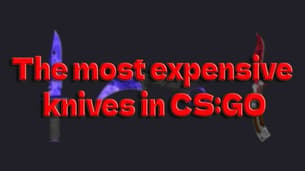
Esports anmeldelser, videospillnyheter og gjennomganger
 Passion UA inngår partnerskap med LORGAR for å styrke spillernes prestasjoner og supporternes opplevelsePassion UA kunngjør LORGAR som sin offisielle tekniske partner, og leverer Ready-to-Play-løsninger, fan-gaver og et fullt drevet laghusøkosystem.
Passion UA inngår partnerskap med LORGAR for å styrke spillernes prestasjoner og supporternes opplevelsePassion UA kunngjør LORGAR som sin offisielle tekniske partner, og leverer Ready-to-Play-løsninger, fan-gaver og et fullt drevet laghusøkosystem. Roblox Meta Lock Koder mars 2026Få de beste Roblox Meta Lock-kodene og øk spillet ditt.
Roblox Meta Lock Koder mars 2026Få de beste Roblox Meta Lock-kodene og øk spillet ditt. Oversikt over VALORANT Masters Santiago 2026VALORANT Masters Santiago 2026-guide: lag, datoer, format og premiepott på 1 million dollar.
Oversikt over VALORANT Masters Santiago 2026VALORANT Masters Santiago 2026-guide: lag, datoer, format og premiepott på 1 million dollar. VALORANT Masters Santiago 2026: Komplett lagnivåliste og Pick’Em-guideVALORANT Masters Santiago 2026 er nesten her. Vi deler opp hele nivålisten, forklarer hvert lags sjanser og deler Pick’Em-spådommer for å hjelpe deg å forstå hvem som er favorittene.
VALORANT Masters Santiago 2026: Komplett lagnivåliste og Pick’Em-guideVALORANT Masters Santiago 2026 er nesten her. Vi deler opp hele nivålisten, forklarer hvert lags sjanser og deler Pick’Em-spådommer for å hjelpe deg å forstå hvem som er favorittene. Forhåndsvisning av sluttspillet i Dota 2 DreamLeague sesong 28Oppdag alt om sluttspillet i DreamLeague sesong 28: lag, format, premiepott og spådommer.
Forhåndsvisning av sluttspillet i Dota 2 DreamLeague sesong 28Oppdag alt om sluttspillet i DreamLeague sesong 28: lag, format, premiepott og spådommer. ESL Pro League sesong 23: Forhåndsvisning av online-scenenForhåndsvisning av ESL Pro League sesong 23 online-fase: lag, sveitsisk format, premieutdeling, LAN-finaler i Stockholm og viktige utfordrere å følge med på.
ESL Pro League sesong 23: Forhåndsvisning av online-scenenForhåndsvisning av ESL Pro League sesong 23 online-fase: lag, sveitsisk format, premieutdeling, LAN-finaler i Stockholm og viktige utfordrere å følge med på. Traxus: Belønninger og oppdrag fra Marathon FactionTraxus OffWorld Industries er Marathons mektigste selskap – her er alle oppgraderinger, kontrakter og belønninger fraksjonen tilbyr.
Traxus: Belønninger og oppdrag fra Marathon FactionTraxus OffWorld Industries er Marathons mektigste selskap – her er alle oppgraderinger, kontrakter og belønninger fraksjonen tilbyr.
 Maraton: Slik låser du opp fraksjoner og får belønningene deresMarathon lanseres 5. mars 2026 på PC, PS5 og Xbox Series X|S – slik fungerer Factions.
Maraton: Slik låser du opp fraksjoner og får belønningene deresMarathon lanseres 5. mars 2026 på PC, PS5 og Xbox Series X|S – slik fungerer Factions.
 Marathon Server Slam starter: Nøyaktig starttid og belønningerBungies Marathon Server Slam er her fra 26. februar til 2. mars. Få detaljer om starttider, gratis belønninger og hvordan du blir med.
Marathon Server Slam starter: Nøyaktig starttid og belønningerBungies Marathon Server Slam er her fra 26. februar til 2. mars. Få detaljer om starttider, gratis belønninger og hvordan du blir med.
 Resident Evil Requiem: Utgivelsesdato, utgaver, gameplayUtforsk Resident Evil 9 (Requiem)-utgaver, priser og plattformer. Forhåndsbestillingsdetaljer, Raccoon City-fortellinger og nye spillfunksjoner for PC, PS5, Xbox og Switch 2.
Resident Evil Requiem: Utgivelsesdato, utgaver, gameplayUtforsk Resident Evil 9 (Requiem)-utgaver, priser og plattformer. Forhåndsbestillingsdetaljer, Raccoon City-fortellinger og nye spillfunksjoner for PC, PS5, Xbox og Switch 2.De beste artiklene
 De dyreste CS:GO-knivene i 2022Ønsker du å kjøpe en bil? Eller kanskje et skin i spillet for samme pris kan være bedre?
De dyreste CS:GO-knivene i 2022Ønsker du å kjøpe en bil? Eller kanskje et skin i spillet for samme pris kan være bedre? Beste CSGO-markedsplasser 2023: Hvor du kan kjøpe og selge CSGO-skinnLa oss finne ut hvor det er best å kjøpe kosmetiske gjenstander til lageret ditt.
Beste CSGO-markedsplasser 2023: Hvor du kan kjøpe og selge CSGO-skinnLa oss finne ut hvor det er best å kjøpe kosmetiske gjenstander til lageret ditt. 


